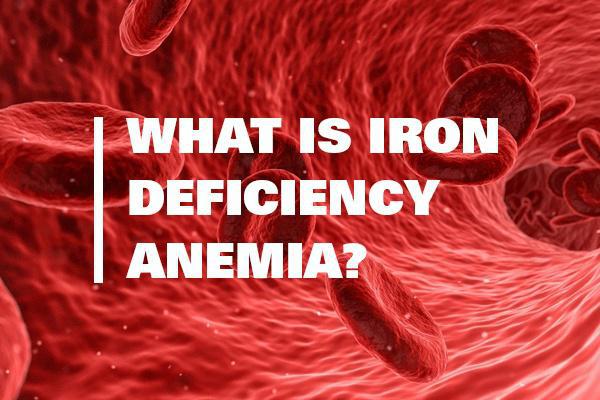What is Iron Deficiency Anemia?

Iron serves several very important functions in the human body. First and foremost, it is critical in the production of hemoglobin, the molecule in red blood cells that carries oxygen to the entire body. Second, iron is important in the maintenance of healthy cells, hair, nails, and skin.
Iron deficiency anemia occurs when the level of hemoglobin in the blood is lower than normal; thus, the level of iron in the blood is significantly lower than normal. Your entire body cannot receive the amount of oxygen it requires to function effectively and normally. Among several other symptoms, iron deficiency anemia may make you tired and short of breath.
Iron deficiency anemia symptoms
Iron deficiency anemia can often be effectively treated with the simple addition of an iron supplement to your diet. However, one challenge in addressing iron deficiency anemia is that initially there may be no discernable symptoms, or the symptoms may appear to result from unrelated conditions. Because of these complications, additional tests and/or treatments for IDA may be necessary. This is particularly true if your doctor thinks that you may be bleeding internally. This is why detection and treatment of IDA may not be as simple and straightforward as taking an iron supplement. IDA symptoms can include:
- Shortness of Breath
- Headaches
- Dizziness
- Fast Heartbeat
- Weakness
- Brittle Nails
- Chest Pain
- Ice Cravings
- Fatigue
- Pale Skin
Symptoms cannot be used to diagnose IDA; if you are experiencing these symptoms it is important to consult with your doctor about Iron Deficiency Anemia testing and possible options for treatment.
Possible Complications of Iron Deficiency Anemia
Blood Loss
Certain cancers that lead to blood loss can lead to IDA. This is because when you lose blood you also lose iron.
Anticancer Therapies
Certain anticancer therapies, such as chemotherapy, can affect your red blood cells which may contribute to iron loss.
Erythropoiesis Stimulating Agents
A medication that some patients may be prescribed to, to help them make red blood cells. However, erythropoiesis stimulating agents (ESAs) cause your body to use iron faster than normal. If you do not take extra iron you may develop IDA.
Inflammation
Inflammation in the body can drive up levels of hepcidin. Hepcidin is a hormone that helps regulate iron regulation. Cancer patients that experience inflammation may have trouble with iron absorption leading to IDA.
Nutrition Deficiencies
Common cancer symptoms and treatments can lead to appetite loss ultimately impacting the patient’s ability to take in food and absorb nutrients. If there is not enough iron being consumed in one’s diet it can raise the risk of developing Iron Deficiency Anemia.
Iron Deficiency Anemia Treatment
Iron-deficiency anemia treatment will depend on its cause and severity. Treatments may include iron supplements, procedures, surgery, and dietary changes. Severe iron-deficiency anemia may require intravenous (IV) iron therapy or a blood transfusion. Iron supplements generally take several weeks or even several months to work at their full effect, so be patient and continue to take them as ordered by your doctor. Your doctor will monitor your blood iron levels throughout your course of treatment.
It is possible that iron supplements will not increase your blood’s iron levels; in that case, it is likely that the cause will require further testing, investigation, and treatment. This might involve:
- Oral contraceptives that lighten menstrual blood flow
- Surgery to remove a bleeding tumor, fibroid, or polyp
- Antibiotics and other peptic ulcer medications
- As mentioned above, if the iron deficiency is severe, treatment may require intravenous blood transfusions to quickly replace hemoglobin and blood iron.
Intravenous (IV) iron is given as well under several different situations:
- When the patient doesn’t tolerate oral iron very well
- Iron blood levels need to come up quickly (like at times prior to pregnancy or before or after surgery)
- When iron absorption in the gut is an issue (e.g. people who have had a gastric bypass).
- Not responding to iron tablets (e.g. due to chronic health conditions)
- Have chronic kidney or heart failure
- There are also several types of IV iron that can be taken without too many side effects.
Contact Hunterdon Hematology Oncology to learn more about iron deficiency anemia today!

